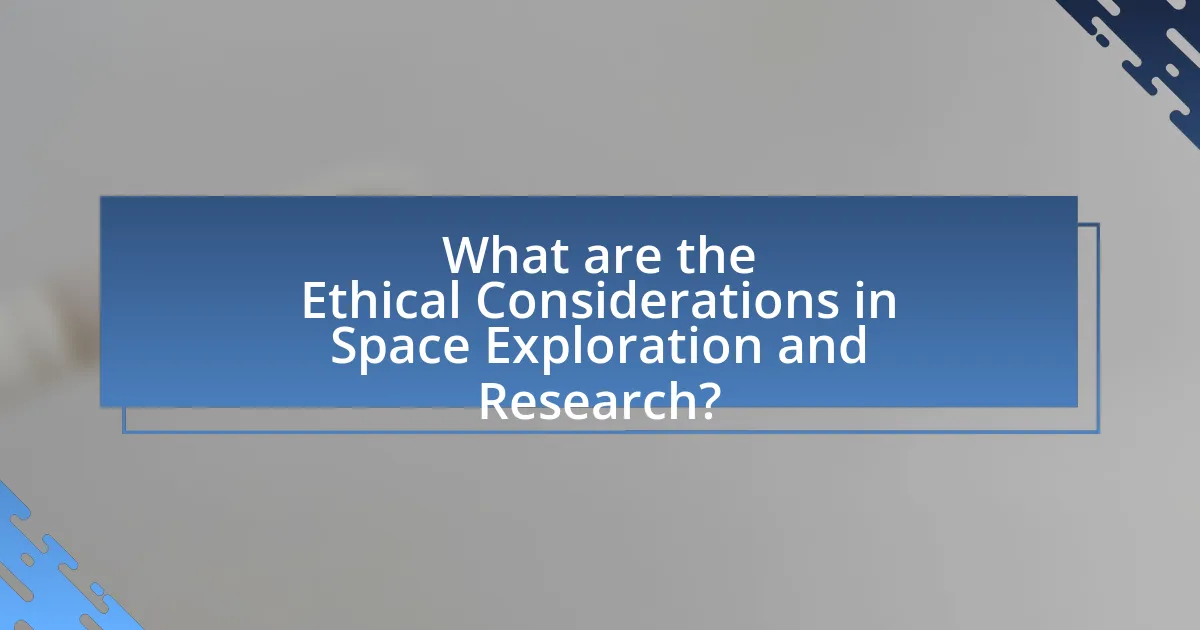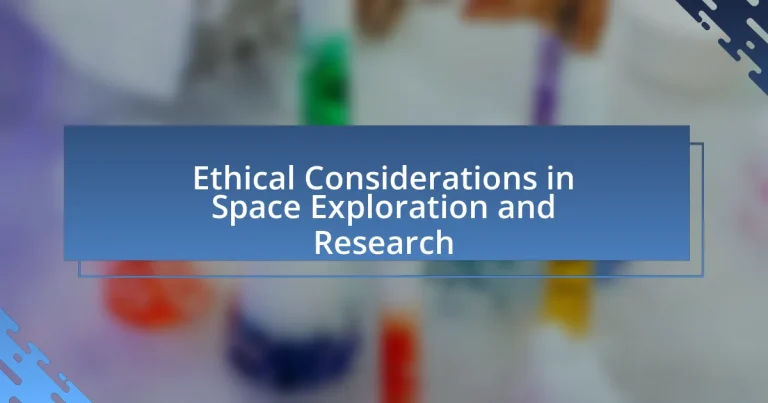The article focuses on the ethical considerations in space exploration and research, emphasizing the importance of preserving extraterrestrial environments, preventing contamination, and addressing resource exploitation. It discusses the ethical dilemmas faced during space missions, such as astronaut safety and the implications of planetary protection. Key ethical principles guiding space exploration include international cooperation, justice, and beneficence, while cultural perspectives influence ethical frameworks. The article also highlights the responsibilities of space agencies and private companies, the role of public engagement, and best practices for implementing ethical guidelines in space missions.

What are the Ethical Considerations in Space Exploration and Research?
The ethical considerations in space exploration and research include the preservation of extraterrestrial environments, the potential for contamination, and the implications of resource exploitation. Preservation of environments is crucial to avoid irreversible damage to celestial bodies, as highlighted by the Outer Space Treaty of 1967, which emphasizes the need for responsible exploration. Contamination concerns arise from the risk of Earth microbes affecting alien ecosystems, which could compromise scientific integrity and biodiversity. Additionally, the exploitation of space resources raises questions about ownership, equity, and the rights of future generations, as discussed in various academic papers, including “Ethics of Space Exploration” by James S.J. Schwartz, which examines the moral responsibilities of humanity in the cosmos.
Why is ethics important in the context of space exploration?
Ethics is important in the context of space exploration because it guides decision-making regarding the responsible use of resources, the treatment of potential extraterrestrial life, and the impact on Earth’s environment. Ethical frameworks help ensure that space activities do not exploit or harm celestial bodies, as outlined in the Outer Space Treaty of 1967, which emphasizes the peaceful use of outer space and the responsibility of nations to avoid harmful contamination. Furthermore, ethical considerations address issues such as the rights of future generations to access space resources and the equitable distribution of benefits derived from space exploration.
What ethical dilemmas arise during space missions?
Ethical dilemmas during space missions include the potential for harm to astronauts, the prioritization of scientific goals over human life, and the implications of planetary protection. The risk to astronauts’ health and safety is paramount, as missions expose them to radiation and psychological stress, raising questions about informed consent and the right to refuse participation. Additionally, the pursuit of scientific knowledge may lead to decisions that compromise crew safety, such as pushing for extended missions despite known risks. Furthermore, the ethical responsibility to avoid contaminating other celestial bodies complicates exploration efforts, as it raises concerns about the preservation of extraterrestrial ecosystems. These dilemmas highlight the complex interplay between human welfare, scientific advancement, and environmental stewardship in space exploration.
How do ethical considerations impact decision-making in space research?
Ethical considerations significantly impact decision-making in space research by guiding the development and implementation of policies that prioritize human rights, environmental protection, and the responsible use of resources. For instance, the Outer Space Treaty of 1967 establishes that space exploration should benefit all humanity and prohibits the appropriation of celestial bodies, reflecting ethical commitments to shared access and sustainability. Additionally, ethical frameworks influence decisions regarding the treatment of potential extraterrestrial life forms, ensuring that research does not harm these entities or their environments. This ethical lens is crucial for fostering international cooperation and public trust in space initiatives, as seen in collaborative projects like the International Space Station, which emphasize shared ethical responsibilities among nations.
What are the key ethical principles guiding space exploration?
The key ethical principles guiding space exploration include the preservation of celestial environments, the promotion of international cooperation, and the consideration of potential impacts on extraterrestrial life. Preservation of celestial environments emphasizes the responsibility to avoid contamination and degradation of other planets and moons, as outlined in the Outer Space Treaty of 1967, which mandates that space exploration should be conducted for the benefit of all humanity. International cooperation is crucial, as space is a global commons, and collaborative efforts can enhance scientific knowledge and reduce conflicts over resources. Lastly, the consideration of potential impacts on extraterrestrial life involves ethical deliberations about the implications of discovering life forms, which raises questions about their rights and the moral obligations of humanity, as discussed in various scientific and ethical forums.
How do principles of justice apply to space exploration?
Principles of justice apply to space exploration by ensuring equitable access to resources, benefits, and opportunities derived from space activities. These principles advocate for fair distribution of the advantages gained from space exploration, such as scientific knowledge and technological advancements, among all nations and peoples. For instance, the Outer Space Treaty of 1967 emphasizes that space exploration should be conducted for the benefit of all humanity, reinforcing the idea that no single nation should monopolize space resources. Additionally, discussions around space mining highlight the need for regulations that prevent exploitation and promote shared benefits, aligning with justice principles that seek to protect the interests of less developed nations.
What role does beneficence play in space research ethics?
Beneficence plays a crucial role in space research ethics by emphasizing the obligation to promote the well-being of individuals and communities affected by space exploration. This principle guides researchers to consider the potential benefits of their work, such as advancements in technology, knowledge, and societal welfare, while minimizing harm to both human and non-human entities. For instance, the ethical guidelines established by organizations like NASA and the European Space Agency highlight the importance of beneficence in ensuring that space missions contribute positively to humanity and the environment. These guidelines advocate for responsible practices that prioritize safety, sustainability, and the equitable distribution of benefits derived from space research.
How do cultural perspectives influence ethical considerations in space exploration?
Cultural perspectives significantly influence ethical considerations in space exploration by shaping values, priorities, and interpretations of responsibility. Different cultures may prioritize environmental stewardship, technological advancement, or human rights differently, leading to varied ethical frameworks. For instance, Indigenous perspectives often emphasize the interconnectedness of all life and the importance of preserving celestial bodies, which contrasts with more utilitarian views that focus on resource extraction. This divergence can affect international agreements and collaborative efforts in space missions, as seen in the differing approaches to planetary protection and the treatment of extraterrestrial environments. Such cultural influences necessitate inclusive dialogue to ensure ethical practices that respect diverse viewpoints in global space exploration initiatives.
What are the differing views on space exploration ethics across cultures?
Differing views on space exploration ethics across cultures highlight significant variations in priorities and values. For instance, Western cultures often emphasize technological advancement and scientific discovery, viewing space exploration as a means to enhance human knowledge and capabilities. In contrast, many Indigenous cultures prioritize the preservation of Earth and its ecosystems, expressing concerns about the potential exploitation of extraterrestrial resources and the ethical implications of colonization.
Additionally, countries like Japan and China approach space ethics with a focus on international cooperation and the peaceful use of outer space, reflecting their cultural values of harmony and collective progress. In contrast, some nations may prioritize national security and competition, leading to differing ethical frameworks regarding the militarization of space. These cultural perspectives shape policies and practices in space exploration, influencing global discourse on ethical considerations in this field.
How can cultural sensitivity be integrated into space missions?
Cultural sensitivity can be integrated into space missions by incorporating diverse cultural perspectives in mission planning and execution. This involves engaging with representatives from various cultural backgrounds to ensure that their values, beliefs, and practices are respected and considered in mission objectives. For instance, NASA’s Artemis program has included consultations with Indigenous groups to understand their cultural significance related to space exploration. Additionally, training astronauts in cultural awareness and sensitivity can enhance collaboration and communication among international teams, fostering a more inclusive environment. Such practices not only promote ethical considerations but also improve mission effectiveness by leveraging diverse viewpoints.
What are the implications of space exploration on planetary protection?
Space exploration has significant implications for planetary protection, primarily concerning the prevention of biological contamination between Earth and other celestial bodies. The introduction of Earth organisms to extraterrestrial environments can disrupt local ecosystems and potentially harm indigenous life forms, while also risking the contamination of Earth with extraterrestrial materials. For instance, the Outer Space Treaty of 1967 emphasizes the need for nations to avoid harmful contamination of space and celestial bodies, establishing a framework for planetary protection. Additionally, missions to Mars and Europa are subject to strict planetary protection protocols to mitigate these risks, as highlighted by NASA’s Planetary Protection Policy, which categorizes missions based on their potential for contamination and outlines specific measures to prevent it.
Why is planetary protection crucial for ethical space exploration?
Planetary protection is crucial for ethical space exploration because it prevents contamination of celestial bodies and preserves their natural state for scientific study. This practice ensures that Earth microbes do not interfere with potential extraterrestrial ecosystems, which is vital for understanding the origins of life and the potential for life beyond Earth. The Outer Space Treaty of 1967 emphasizes the responsibility of nations to avoid harmful contamination, highlighting the ethical obligation to respect other worlds. Additionally, the preservation of planetary environments allows for accurate scientific research, as contamination could lead to misleading results regarding the existence of life or the history of a planet.
What measures are in place to prevent contamination of celestial bodies?
To prevent contamination of celestial bodies, space agencies implement strict planetary protection protocols. These protocols are designed to minimize the risk of biological contamination during space missions, particularly for missions targeting Mars and other potentially habitable environments. For instance, NASA’s Planetary Protection Policy categorizes missions based on their potential for contamination and outlines specific sterilization procedures for spacecraft and instruments. The Outer Space Treaty of 1967 also mandates that countries avoid harmful contamination of celestial bodies, reinforcing international cooperation in maintaining the integrity of extraterrestrial environments.
How do we address the ethical treatment of potential extraterrestrial life?
To address the ethical treatment of potential extraterrestrial life, we must establish guidelines that prioritize respect, preservation, and non-interference. These guidelines can be informed by existing ethical frameworks, such as the principles outlined in the Outer Space Treaty of 1967, which emphasizes the peaceful exploration of space and the responsibility of nations to avoid harmful contamination of celestial bodies. Additionally, the Planetary Protection Policy, developed by NASA, provides protocols to prevent biological contamination during space missions, ensuring that any potential extraterrestrial ecosystems are preserved. By integrating these frameworks, we can create a comprehensive ethical approach that safeguards extraterrestrial life while promoting responsible exploration.
What ethical frameworks exist for the discovery of extraterrestrial organisms?
Several ethical frameworks exist for the discovery of extraterrestrial organisms, including the precautionary principle, biocentrism, and the principle of planetary protection. The precautionary principle advocates for preventive action in the face of uncertainty, emphasizing the need to avoid harm to both extraterrestrial life and Earth’s biosphere. Biocentrism prioritizes the intrinsic value of all living beings, suggesting that extraterrestrial organisms should be respected and protected. The principle of planetary protection, established by the Outer Space Treaty of 1967, aims to prevent contamination of celestial bodies and the Earth, ensuring that scientific exploration does not compromise potential ecosystems. These frameworks guide ethical decision-making in the context of space exploration and the potential discovery of life beyond Earth.
How should we approach the potential rights of extraterrestrial life forms?
We should approach the potential rights of extraterrestrial life forms by establishing a framework that recognizes their existence and potential sentience. This framework should be informed by ethical principles similar to those applied to human rights, emphasizing respect, protection, and non-exploitation. For instance, the Outer Space Treaty of 1967 highlights the importance of peaceful exploration and the responsibility of nations to avoid harmful contamination of celestial bodies, which can be extended to the consideration of extraterrestrial life. Additionally, the development of guidelines by organizations such as the International Academy of Astronautics, which advocates for the ethical treatment of potential extraterrestrial entities, supports the notion that rights should be considered in the context of their welfare and preservation.
What are the ethical responsibilities of space agencies and private companies?
Space agencies and private companies have ethical responsibilities that include ensuring the safety of astronauts, protecting the environment, and promoting equitable access to space. These entities must prioritize the health and safety of their personnel by adhering to rigorous safety protocols and conducting thorough risk assessments, as evidenced by NASA’s implementation of safety measures following the Challenger and Columbia disasters. Additionally, they are responsible for minimizing space debris and mitigating the impact of their activities on celestial bodies, which is supported by guidelines from the Outer Space Treaty of 1967 that emphasizes the preservation of space for future generations. Furthermore, promoting equitable access involves addressing the digital divide and ensuring that space exploration benefits all of humanity, as highlighted by initiatives like the United Nations Office for Outer Space Affairs that advocate for inclusive participation in space activities.
How do accountability and transparency play a role in ethical space exploration?
Accountability and transparency are crucial for ethical space exploration as they ensure responsible decision-making and foster public trust. Accountability involves holding organizations and individuals responsible for their actions, which is essential in addressing the potential risks and ethical dilemmas associated with space missions. For instance, the Outer Space Treaty of 1967 mandates that countries are liable for damage caused by their space activities, reinforcing the need for accountability. Transparency, on the other hand, involves openly sharing information about missions, objectives, and outcomes, which helps to mitigate misinformation and promotes informed public discourse. The European Space Agency, for example, publishes detailed reports on its missions and funding, exemplifying transparency in its operations. Together, these principles create a framework that guides ethical considerations in space exploration, ensuring that activities are conducted in a manner that respects both human and environmental rights.
What are the implications of commercial interests on ethical standards in space research?
Commercial interests significantly influence ethical standards in space research by prioritizing profit over scientific integrity. This shift can lead to compromised safety protocols, reduced transparency, and potential exploitation of space resources, undermining the collaborative spirit essential for international space exploration. For instance, the commercialization of satellite launches has raised concerns about the prioritization of financial gain over adherence to established ethical guidelines, as seen in cases where companies have rushed to market without thorough safety evaluations. Such practices can result in environmental degradation and conflicts over space resource ownership, highlighting the need for robust regulatory frameworks to ensure that ethical standards are upheld amidst growing commercial pressures.
How can we ensure public engagement in ethical discussions about space exploration?
To ensure public engagement in ethical discussions about space exploration, it is essential to implement inclusive communication strategies that actively involve diverse communities. Engaging the public can be achieved through public forums, educational programs, and digital platforms that facilitate dialogue and feedback. For instance, NASA has successfully utilized social media and community outreach initiatives to gather public opinions and foster discussions on ethical implications, demonstrating that transparency and accessibility can enhance public involvement.
What strategies can be employed to involve the public in ethical decision-making?
To involve the public in ethical decision-making, strategies such as public consultations, participatory workshops, and online platforms for feedback can be employed. Public consultations allow stakeholders to voice their opinions and concerns, fostering a sense of ownership in the decision-making process. Participatory workshops engage diverse groups in discussions, ensuring that multiple perspectives are considered, which is crucial in complex fields like space exploration. Online platforms facilitate broader participation by enabling individuals to contribute their views conveniently, thus increasing transparency and accountability. Research indicates that involving the public in ethical discussions leads to more socially acceptable outcomes, as seen in the 2018 study by the National Academy of Sciences, which highlighted the importance of public engagement in shaping ethical guidelines for emerging technologies.
How does public opinion shape the ethical landscape of space exploration?
Public opinion significantly shapes the ethical landscape of space exploration by influencing policy decisions and funding priorities. When the public expresses concern over issues such as planetary protection, resource exploitation, or the militarization of space, policymakers often respond by implementing regulations and ethical guidelines that reflect these societal values. For instance, surveys indicate that a majority of people support strict measures to prevent contamination of extraterrestrial environments, which has led to the establishment of protocols by organizations like NASA and the European Space Agency. This alignment between public sentiment and ethical standards ensures that space exploration aligns with broader societal expectations and moral considerations.
What best practices can be adopted for ethical space exploration and research?
Best practices for ethical space exploration and research include adhering to international treaties, ensuring transparency in operations, and prioritizing planetary protection. International treaties, such as the Outer Space Treaty of 1967, establish guidelines for the peaceful use of outer space and the responsibility of nations to avoid harmful contamination of celestial bodies. Transparency in operations fosters trust and collaboration among nations and organizations, allowing for shared knowledge and resources. Prioritizing planetary protection involves implementing measures to prevent biological contamination of other planets and moons, which is crucial for preserving potential extraterrestrial ecosystems. These practices collectively promote responsible exploration and safeguard both human interests and the integrity of space environments.
How can ethical guidelines be effectively implemented in space missions?
Ethical guidelines can be effectively implemented in space missions through the establishment of comprehensive frameworks that prioritize accountability, transparency, and stakeholder engagement. Organizations like NASA and ESA have developed ethical codes that outline responsibilities towards scientific integrity, environmental protection, and the well-being of all participants involved in space exploration. For instance, NASA’s “Code of Ethics” emphasizes the importance of ethical conduct in research and decision-making processes, ensuring that missions adhere to established ethical standards. Additionally, involving diverse stakeholders, including ethicists, scientists, and the public, in the planning stages of missions fosters a collaborative approach to ethical considerations, as seen in the development of the “Outer Space Treaty,” which promotes peaceful exploration and the responsible use of space resources.
What role does education play in promoting ethics in space exploration?
Education plays a crucial role in promoting ethics in space exploration by equipping individuals with the knowledge and critical thinking skills necessary to navigate complex ethical dilemmas. Through formal education programs, such as university courses in space law, ethics, and policy, students learn about the implications of space activities on humanity and the environment. For instance, the International Academy of Astronautics emphasizes the importance of ethical training in its educational initiatives, highlighting that understanding the moral responsibilities associated with space exploration is essential for future leaders in the field. This foundational knowledge fosters a culture of ethical awareness, encouraging professionals to consider the broader impacts of their work, such as planetary protection and the equitable use of space resources.


